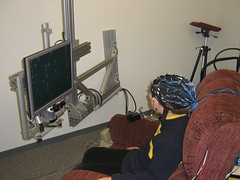The impetus for our trip to Chicago on Saturday was to meet up with John's cousin-in-law, Amy, who's does autism research at the University of Chicago (she recently accepted a position at Marquette, so will be local in the near future). She studies the brain waves of autism spectrum children to help understand "what makes them tick." So, we weren't getting an official diagnosis, but she does some basic screening to see who fits in with her study group. Not a bad place to see if further testing would be helpful - and it was free.
So Gus had some academic and social testing done at her office. The academic part is along the lines of an I.Q. test, but not quite as definitive. The social part was to see how he interacts with others (through questions and games) and to look for a number of Asperger symptoms.
I enjoyed getting to sit in on these tests - particularly the vocabulary part of the academic testing which he had a stellar performance on, thanks to our, um, unique academic environment. The other researcher, who performed this test, couldn't keep from smiling (she wasn't supposed to tell him whether his answers were right or not) when typical responses were along the lines of, "Um, this is just a guess, but is it 'tenacious'?" The overall results of this test were particularly reassuring since his tendency to work his way through things very slowly has caused us to by no means cover a full traditional academic range of subjects and yet his overall academic knowledge and competency was quite good.
The social aspect of the screening was pretty what I expected in the particulars (reluctant to answer open-ended questions or ones requiring descriptions of things like emotions).
The long and the short of it is that, though Gus exhibits some Asperger-like tendencies, he really doesn't fit the spectrum in a number of key areas (and so he didn't participate in the full research, though he got to try on some of the equipment - which he was very interested in!). Apparently shyness and awkwardness are often confused with Asperger-like social disabilities. Added to this are Gus's developmental delays in fine and gross motor skills - which certainly can be part of the Asperger picture. Having a specific cause for these (namely his difficult birth - cord around the neck and an initial Apgar score of 1) points away from an Asperger diagnosis. It also makes sense out of why these areas are all gradually improving, though they take a lot more effort than they do for most people.
These experiences have crystallized a few concepts in my mind. One is the necessity to adjust teaching methods according to each child's needs. There are some obvious potential benefits for homeschool situations here - often the parent is better able to make important distinctions in a particular child involving truths such as:
Smart doesn't always equal fast.
and
"Slow" doesn't always equal lazy.
I put slow in quotation marks because the word has certain developmental connotations that aren't intended here.


4 comments:
I can completely relate to:
Smart doesn't always equal fast.
and
"Slow" doesn't always equal lazy.
I have wondered if this might be related to a child's temperament.
I was happy to read of Gus' results after praying for him. May God continue to bless your homeschooling endeavors!
Thanks for the note (and the prayers).
Yes, I think it's very much related to temperament and learning style (and we found Mercy Academy's learning style assessment extremely helpful and worth every penny!) though we are also dealing with some additional pieces of the puzzle.
I was interested in hearing about Gus's diagnosis, too. My oldest was slow but smart; still is, in fact. I think it is characteristic of strong introverts. Sometimes I wonder if St Thomas Aquinas was that way too, and that that might be why his classmates gave him that famous nickname "Dumb Ox."
Yes - I can see that Willa. And it was such a delight for me (and so encouraging) to meet him and see how happy he is at TAC! :)
Post a Comment